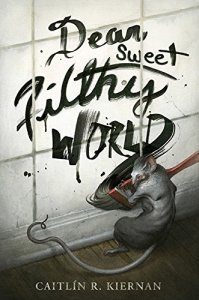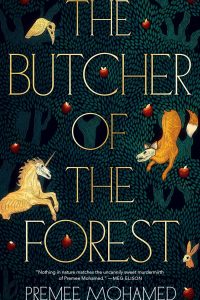Charles Payseur Reviews Short Fiction: Fantasy, Lightspeed, and F&SF
 Fantasy 7/22
Fantasy 7/22
Lightspeed 7/22
F&SF 7-8/22
Moving into July, Fantasy features a number of works that border on science fiction. Stories of stars crafting solar systems and futures where government authoritarianism leads to water riots, mass deportations, and interments. For all the science fictional touches, though, Fantasy finds ways to focus on fantasy, as in Sabrina Vourvoulias’s “The Memory of Chemistry”, which follows the life of a woman surrounded by chemistry – from her grandmother who used it to make rum to her mother who used it to make art. For the narrator, chemistry is more about justice, about pushing to make the world a better place and fight against inequality and prejudice. In focusing on the scientific chemistry, though, it’s important not to overlook the interpersonal chemistry that ends up guiding the narrator, which Vourvoulias uses to weave together lives and draw together a small chosen family of scientists who are also a kind of coven. They make magic not only from physical ingredients around them – the biology and chemistry and physics they use to craft their potions – but also their own desire and intent, which they use as spells to hold to each other, protect one another, and find those they have lost. The story links to the author’s novel, Ink, but can easily be read all on its own. “Odd Peas in a Pod” by B.S also focuses on the magic of community, and how people put into a place become a kind of magical and musical landscape that the narrator observes and moves through. And that landscape, that place that holds the characters together, can be a source of power and a prison both. The narrator observes and dances through it, around absences and dangers they can’t yet fully articulate or imagine. Moving to the issue’s poetry, and Shilpa Kamat takes an interested turn on the classic fairy tale with “Goldilocks”. Shedding the supposed innocence of the girl who breaks into the house of bears, this narrator is intense and seductive and knows exactly what she’s doing. The work flows with a heat and promise that is seductive and kinetic. Though perhaps not innocent, she is also unrepentant and confident, and it’s a great complicating of the original text.
July’s Lightspeed deals rather heavily with loss, with final meetings and partings. RJ Theodore & Maurice Broaddus really explore life, death, grief, and history in “Singing the Ancient Out of the Dark”. In it, Louise Chau is a freelance Archivist breaking a kind of quarantine around a planet in order to get the last trace of what she thinks is a dying civilization. What she finds instead when she lands (or crashes, to be most accurate) is not the last remnants of something once-great, though. The landscape might seem blasted, yes, and the human population might seem to have dwindled. But under that is a truth greater than she was quite ready for, and it opens the door on something that might be just beginning. It’s a strange and almost haunting story, about change and transformation. “The Rustle of Growing Things” by Isabel Cañas shifts away from the galaxy-wide to focus on a much more intimate scale – a woman spending what might be her last night with a man off to join guerilla fighting in the mountains. Her yearning, her desire to hold onto him, becomes a kind of magic. Through that force, the world itself reacts and bends, and Cañas captures that beautifully. Finally, in An Old Man Cometh and He Is Overgrown” by Lyndsie Manusos, a young man named Cog returns to his family home after getting word of his mother’s death. Cog’s return, though, is more about his father’s grief than his own, and pulls both men into magical work that Cog was supposed to inherit but refused. The story, like the landscape of the village Cog finds – mired in fog and haunted by needful ghosts – is dense and hides layers of hurt and hope. Manusos carefully guides Cog through the work of mending what can be mended in one familial relationship while showing the pain and complexity left in the wake of another’s irreparable severing. It provides an emotionally staggering experience, with a warm and lovely ending.
I’ll close out this month with a look at the July/August issue of F&SF. The issue opens with an almost surreal look at alternative histories, and realities, in “Starblind, Booklost, and Hearing the Songs of True Birds” by Rudi Dornemann, who is one of seven writers making their F&SF debut this issue. The story focuses on Vitalius, a man who in part wants to free his brother from a rather grim curse of prophecy. To do that, though, he’d have to unlock an alternate history from where it’s been shut away so that the one that led to his brother’s fate would be supplanted. As a historian, he’s in a unique place to accomplish that, but he also knows what it would mean giving up – a life’s work and the possibility that things could change for the worse. The prose is vibrant and haunting, the journey Vitalius takes a descent through the city and through time, bringing back up a magic of change and festival and sacrifice. It’s a captivating story. Beth Goder keeps things rather strange and almost dreamlike in “Mycelium”, which brings the narrator and a close friend on a river expedition to visit a golden head. It’s an almost-forgotten idol, but possesses a kind of magic all the same. Goder does lovely work in showing the characters poised on the edge of change, hesitant because they fear what they might lose, but still willing to trust in each other and in the magic of the situation in order to take a chance. It’s a mysterious and beautiful story. Taking a chance doesn’t work out quite so well for the narrator of Rajeev Prasad’s “The Wild Son”, who begged a nearby lake for a child and was granted one. The child, though, belongs to the lake, to the wild, and carries that wildness inside him. The narrator, who only wanted to break free of the harsh barriers that keep him trapped in the role of butcher, finds in his son a source of hope, disappointment, and sorrow. And love. It’s the love that might not be able to undo the strict policing of roles in the narrator’s world, but that does show the narrator that there are alternatives to accepting what society demands. It’s an at-times difficult read, not offering easy answers or outcomes, but Prasad captures something real and powerful all the same.
Moving to the poetry, Ellis Bray’s F&SF debut “The Things We Know” carries with it a touch of the past and present. The narrator of the poem recounts what “we” know, a kind of collective history passed down in stories – a link to a time before, a time when “we” were different, perhaps, but fueled by the same desires and hopes and a reaching for the sky and stars. The piece might also be a warning, that as we are linked to that time we might also come to the same disastrous end. Bray uses rhyme and rhythm to great effect. Beth Cato also evokes the past in “When, as an Adult, You Choose to Again Believe in Magic”. In the poem, the narrator finds an old journal and is reminded of a time when they practiced magic in the hopes of protecting and healing their family. Cato conjures a sense of hope and need in the lines, a magic that the narrator has new reasons to want to believe in. It’s a subtle but incredibly moving poem, finding in the almost childish faith in the reality of magic a source of great strength.
Recommended Stories
“The Memory of Chemistry,” Sabrina Vourvoulias (Fantasy 7/22)
This review and more like it in the August 2022 issue of Locus.
 While you are here, please take a moment to support Locus with a one-time or recurring donation. We rely on reader donations to keep the magazine and site going, and would like to keep the site paywall free, but WE NEED YOUR FINANCIAL SUPPORT to continue quality coverage of the science fiction and fantasy field.
While you are here, please take a moment to support Locus with a one-time or recurring donation. We rely on reader donations to keep the magazine and site going, and would like to keep the site paywall free, but WE NEED YOUR FINANCIAL SUPPORT to continue quality coverage of the science fiction and fantasy field.
©Locus Magazine. Copyrighted material may not be republished without permission of LSFF.







